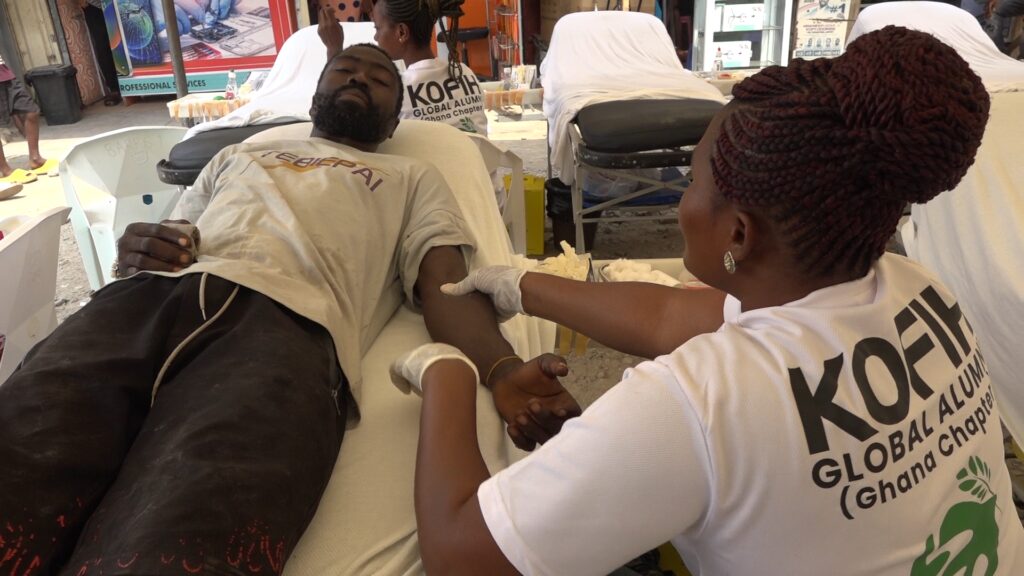
The greater Accra regional hospital is calling for more and intensified public education on the need for voluntary blood donation across the country.
According to the hospital, only 30 percent of the annual national blood transfusion requirement comes from voluntary donors, compromising on testing, processing for safety, reliability and efficiency.
Voluntary blood donation campaigns are conducted regularly in Ghana to encourage individuals to donate blood voluntarily.

These campaigns aim to create awareness about the importance of blood donation for saving lives and maintaining an adequate blood supply.
However, Ghana, like many other countries, faces challenges in maintaining a consistent supply of blood.
Some challenges include misconceptions about blood donation, fear of needles, and cultural beliefs.

Blood is an essential for various medical interventions, including surgeries, trauma care, treatment of certain medical conditions, and maternity care.
Healthcare facilities, including hospitals and clinics, rely on the availability of an adequate and safe blood supply to meet the needs of patients.
It is against these back drops that the Korea foundation for international healthcare global alumni, (KGA) Ghana chapter, an association of health workers who benefited from training programmes in Korea settled for voluntary blood donation as one of its flagship activities.
A Medical Officer at the Greater Accra Regional Hospital, Dr Emmanuel Adepa Adapo, heads the blood donation exercise.
I really appeal to everybody to make it a point to be a voluntary donor. You may be afraid, you may be a bit hesitant, because of the misconceptions. No, voluntary blood donation gives you the opportunity to know your blood group. You also stand the chance to check your weight, blood pressure and other screening for free. You will again receive a voluntary donor card, so that whenever you are in need, blood can also be given to you without any trouble. That is why we call the place a blood bank. You save your blood there, just like you save money in a bank. So that when you are in need, you can go and withdraw. And so, I appeal to every Ghanaian, make it a point to be a voluntary donor. At least, if you cannot donate the three times every year, make it a point to donate on your birthday.

The 2024 campaign held simultaneously at at the Kwame Nkrumah circle and Lashibi in Accra, targeted to collect 500 units of blood.
Accoding to the Project Manager at the KOFIH Ghana office, Fanny Eunice Karikari, the blood donation has become a key feature on the KOFIH Ghana Chapter’s calendar.
And the reason behind this exercise is to at least have enough blood to stock up National Blood Bank and also donate some of them to the various hospitals to help save lives. So, we are hoping to achieve our target for the day. We normally hear there is a shortage of blood in our blood banks. And people are not being able to even have access to blood because there is a shortage. So, this is what motivated us to carry out this exercise. So that at least we can source enough of the blood to stock our banks.

Leaders of the various groups at the Kwame Nkrumah circles took turns to call on their members and the public the embrace voluntary blood donation to help save lives.
Voluntary blood donation is the giving of blood without any financial or other incentives, and it is considered a crucial component of a safe and sustainable blood supply.
Need for Voluntary Blood Donation:
Ghana, like many other countries, relies on voluntary blood donation to meet the blood requirements of its healthcare system.
Voluntary blood donation campaigns are conducted regularly in Ghana to encourage individuals to donate blood voluntarily.
These campaigns aim to create awareness about the importance of blood donation for saving lives and maintaining an adequate blood supply.

However, Ghana, like many other countries, faces challenges in maintaining a consistent supply of blood.
Some challenges include misconceptions about blood donation, fear of needles, and cultural beliefs.
To address these issues, educational initiatives and awareness programmes are often implemented to promote voluntary donation.
The National Blood Service, Ghana, (NBSG) is the agency responsible for coordinating the collection, testing, processing, storage, and distribution of blood and blood products in the country.
The NBSG plays a pivotal role in ensuring a safe and adequate blood supply for healthcare facilities.
The National Blood Service ensures that donated blood is properly tested for blood type and screened for infectious diseases to ensure the safety of both donors and recipients.
Blood types A, B, AB, and O are common, and compatibility is crucial in transfusions.
By Peter Quao Adattor







